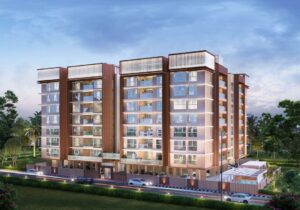Comprising a substantial 34% of India’s current population, millennials stand as the driving force behind the nation’s growth trajectory. Their augmented incomes, increased financial awareness, and unparalleled purchasing capabilities significantly contribute to propelling India’s economy forward.
Moreover, millennials exhibit a greater level of financial prudence compared to preceding generations. They recognize the potential of astute investments, particularly in sectors like real estate. As this dynamic cohort ventures into homeownership, their distinctive preferences and priorities are reshaping the real estate sphere. Gone are the days of standardized homes and conventional expectations. Millennials seek residences that align with their principles, mirror their tech-driven lifestyles, and offer an optimal fusion of convenience, sustainability, and community living. Thus, the question arises: what exactly are the elements that millennials prioritize when purchasing a home? Exploring their intriguing checklist of essential features unveils the fascinating trends shaping the future landscape of real estate.
1. Lifestyle-Centric Living
Millennials recognize that a home transcends beyond mere walls; it’s about how those spaces enable and enhance their lives. Being increasingly health-conscious and environmentally aware, millennials seek residences equipped with top-notch amenities that elevate their lifestyles. They prioritize homes featuring superior facilities like swimming pools, fitness centers, recreational spaces, and other enhancements that contribute positively to their overall well-being and reflect their values.
2. Expansive Residences with High-Quality Design
The millennial generation showcases a strong inclination towards technology and design, desiring homes that boast not only impressive aesthetics but also optimal functionality. As more millennials opt for remote work setups and spend increased time indoors, they seek roomy residences capable of accommodating a home office or even a personal gym. Each dwelling crafted by Lodha is meticulously planned to assist our clients in forging an enhanced lifestyle, whether by seamlessly blending indoor and outdoor spaces or by maximizing the utility of every available square footage.
3. Connectivity And Freedom
The era where homebuyers prioritized residences solely based on proximity to city centers or workplaces has passed. Contemporary millennials, in their quest for a new home, prioritize accessibility to various parts of the city rather than focusing solely on its location. They weigh factors such as nearby infrastructure, proximity to major transportation routes, public transit availability, and the presence of social amenities like malls as crucial considerations, paralleling the importance they place on the construction quality of their prospective homes.
4. Stability in Finances and Emotions
Millennials have gleaned from their parents that the unparalleled blend of financial and emotional security associated with home ownership is invaluable. Consequently, they aspire for more significant accomplishments than preceding generations and perceive purchasing a house as an investment in their future. The pandemic served to reinforce this belief further, as a growing number of young homebuyers witnessed the stability that owning a home can provide. Remarkably, millennials accounted for over 50 percent of home purchases in 2020, significantly contributing to the Indian real estate market, which continued to rise, surpassing the 54% mark in 2022. This upward trajectory in homeownership appears poised to persist.
5. Sustainability
Many millennials prioritize environmental awareness, often seeking residences that integrate sustainable elements such as solar panels, energy-efficient windows, and eco-friendly construction materials when house hunting.
6. Affordability
Considering the financial constraints encountered by numerous millennials, affordability stands as a crucial factor. They seek residences that align with their budget constraints while delivering commendable value for the price.
7. Adaptable and Versatile Areas
Flexibility holds immense importance for millennials who appreciate adaptable spaces capable of meeting their changing requirements. Open floor layouts, multipurpose areas, and dedicated home offices offer the versatility to work, entertain, and evolve. Residences providing customizable choices and opportunities for personalization often appeal significantly to millennial purchasers.
8. Community
For millennials, fostering a sense of community holds paramount importance. They actively seek neighborhoods that encourage connections, support social engagement, and offer a diverse array of facilities. Access to parks, trails, fitness centers, and communal spaces facilitating gatherings ranks high on their priority list. The prospect of establishing connections with like-minded neighbors significantly influences their decisions in purchasing a home.
Millennials go beyond mere shelter when searching for a home. They prioritize aspects that resonate with their values and lifestyles, particularly focusing on connectivity and amenities. To effectively attract this demographic, real estate developers must comprehend and cater to these preferences, providing residences tailored to meet their distinctive needs and evolving aspirations. By doing so, they can tap into the substantial potential of the millennial homebuyer market, securing a prosperous future for India’s real estate industry.
Conclusion
The evolving landscape of real estate sees millennials not just seeking a place to dwell but a holistic environment that aligns with their values and aspirations. Their pursuit encompasses a fusion of functionality, sustainability, and community, steering away from conventional housing norms. This burgeoning segment, contributing significantly to the real estate market, has shifted paradigms by prioritizing connectivity, adaptable spaces, and eco-conscious living. As millennials continue to dominate the housing market, the industry’s future lies in understanding and accommodating their diverse needs.
Real estate developers and stakeholders must adapt to these changing demands to harness the potential of this influential market segment. By offering residences that transcend conventional norms and align with millennial preferences – emphasizing connectivity, versatility, and communal living – the industry can thrive. As this generation’s purchasing power continues to drive the real estate landscape, catering to their distinct lifestyle preferences will be pivotal in shaping a prosperous future for India’s real estate industry.









